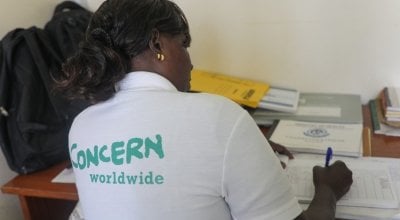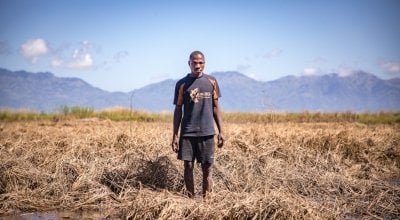
Read our 2024 annual report

Knowledge Hub
#Concerngifts: Changing lives in Malawi
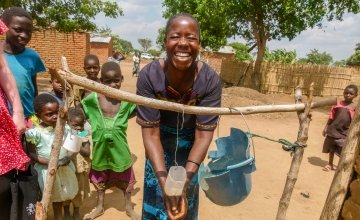
Concern gifts are a great idea for the holiday season. It’s a win-win, allowing you to avoid the shopping frenzy - while making a real difference in someone’s life.
Concern’s Catriona Laughran was in Malawi and witnessed first-hand the transformative power of Concern Christmas Gifts.
Empowering women and communities
Elicy remembers a time when there was no extra income coming into her household because she and her husband were only growing maize, Malawi’s staple crop, on their small farm.
The mother-of-five says: "It was tough. It was very hard to raise children on little food if the harvest was poor… we didn’t have access to other crops such as vegetables and we had no livestock. We worried for these days because we had no other means of income or food."
Thanks to the Concern Christmas Gifts, Elicy received a goat through our Food, Income and Markets Programme.
When the goat had kids, she passed them on to other vulnerable households in Lilongwe, Malawi. This “livestock pass-on” approach was agreed with communities at the outset, ensuring that the benefits of one goat reach many poor families.
Through this programme, Elicy received other crops and learned a variety of ways of improving food production through Conservation Agriculture.
Ambitious Elicy has gone from programme beneficiary to a Lead Farmer in a matter of years and is one of 200 Lead Farmers that are trained on all principles of Conservation Agriculture.
Using techniques learned from Concern’s programme, Elicy increased her maize yields and with her extra income, she has opened a tea room, which is a social meeting place for the village, and is considered a role model in her community.
She says, "Before, I never knew how to budget money or manage a family budget. I feel empowered that I am able to conduct business in the community and understand how to improve yields for crops and livestock and to teach other farmers in the community."
The benefits from gifts are more than financial; Elicy revealed that the programme has had a positive influence on her relationship with her husband as they now handle the finances of the farm together and make decisions ‘equally’.
This is unique in Malawi, as men generally manage the finances of the household.
"We make decisions together. We discuss the finances together and we are happy. After three years working on the programme, we feel life has improved a lot. I want my children to grow up strong and get a good education."
Cooking group and improved nutrition
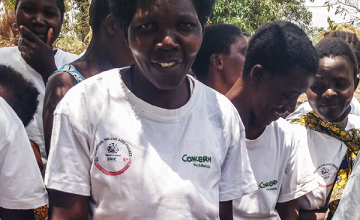
Rose laughs when asked does her food taste good. She nods her head enthusiastically and reveals that her husband and children look forward to their meals every day since she started cooking nutritional meals.
She says: "I have learned cooking skills and I am aware of stunting in children and how it can be prevented through nutrition."
Before, Rose’s family was eating mainly Nsima every day, a starchy dish made from maize, which has very little nutritional value. Thanks to Concern Gifts, Rose was able to become a Lead Mother and take part in a cooking lesson programme with other women in the village.
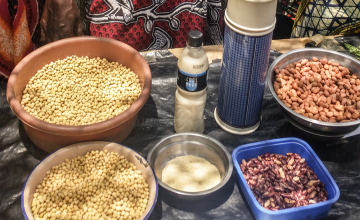
The lead mothers learned about growing, harvesting and cooking foods like gum-nut flour, mango porridge, potatoes and grasshoppers.
Pumpkin leaves, another delicacy once reserved for Christmas dinner, appear in several of the village’s kitchen gardens.
They’re only too happy to share their newfound skills with the wider community and help others understand the important connection between agriculture and nutrition.
"I know the foods that are full of nutrition and are good for my children’s growth," she insists.
"We notice our children have more energy and are not getting sick. I never knew how to make food more healthy.
"Foods such as sweet potato give us sources of Vitamin A, which is good for eyesight and I love to see my children smile when they eat my food. The women in the group also enjoy talking about the food we eat and we think of ways to improve our meals."
Hygiene and hand-washing
Virigita Gasiyamo from Mazawe in the Mchinji district said the introduction of a Tippy Tap has improved sanitation and has reduced nasty bouts of diarrhoea in the household.
She says, "Before the Tippy Tap was introduced, we were handling the kitchen utensils after we went to the toilet, which was putting our health at risk."
A Tippy Tap is made from a large perforated bottle and string and is an inexpensive way to preserve water during hand-washing, as well as acting as a visual reminder to wash before food preparation.
As part of an ongoing initiative, Concern staff have taught householders in the area how to make a Tippy Tap for their village, along with the rudiments of hygiene and hand-washing.
"We believe that this caused diarrhoea in our house because a lot of my children were getting sick.
"Now we are making sure that we wash our hands before we cook in the kitchen and we have had much less illness in our house," the mother of five said.
Like most children, it can be difficult to remind them to wash their hands after they use the toilet or before they eat a meal and Virgita agrees. That’s why the Tippy Tap is placed between a number of houses and is close to where villagers access the fields.
"You just keep reminding them by showing example. I educate my children to know the importance of good sanitation as they don’t want to get sick as it makes them feel bad. The men are the same and it has come to be a habit now for everyone in the village."



